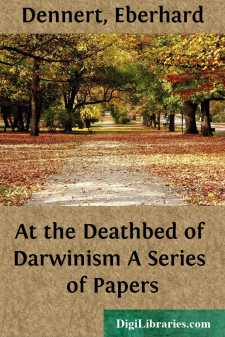Categories
- Antiques & Collectibles 13
- Architecture 36
- Art 48
- Bibles 22
- Biography & Autobiography 813
- Body, Mind & Spirit 142
- Business & Economics 28
- Children's Books 17
- Children's Fiction 14
- Computers 4
- Cooking 94
- Crafts & Hobbies 4
- Drama 346
- Education 46
- Family & Relationships 57
- Fiction 11829
- Games 19
- Gardening 17
- Health & Fitness 34
- History 1377
- House & Home 1
- Humor 147
- Juvenile Fiction 1873
- Juvenile Nonfiction 202
- Language Arts & Disciplines 88
- Law 16
- Literary Collections 686
- Literary Criticism 179
- Mathematics 13
- Medical 41
- Music 40
- Nature 179
- Non-Classifiable 1768
- Performing Arts 7
- Periodicals 1453
- Philosophy 64
- Photography 2
- Poetry 896
- Political Science 203
- Psychology 42
- Reference 154
- Religion 513
- Science 126
- Self-Help 84
- Social Science 81
- Sports & Recreation 34
- Study Aids 3
- Technology & Engineering 59
- Transportation 23
- Travel 463
- True Crime 29
At the Deathbed of Darwinism A Series of Papers
by: Eberhard Dennert
Description:
Excerpt
PREFACE.
The general tendency of recent scientific literature dealing with the problem of organic evolution may fairly be characterized as distinctly and prevailingly unfavorable to the Darwinian theory of Natural Selection. In the series of chapters herewith offered for the first time to English readers, Dr. Dennert has brought together testimonies which leave no room for doubt about the decadence of the Darwinian theory in the highest scientific circles in Germany. And outside of Germany the same sentiment is shared generally by the leaders of scientific thought. That the popularizers of evolutionary conceptions have any anti-Darwinian tendencies cannot, of course, be for a moment maintained. For who would undertake to popularize what is not novel or striking? But a study of the best scientific literature reveals the fact that the attitude assumed by one of our foremost American zoologists, Professor Thomas Hunt Morgan, in his recent work on "Evolution and Adaptation," is far more general among the leading men of science than is popularly supposed. Professor Morgan's position may be stated thus: He adheres to the general theory of Descent, i.e., he believes the simplest explanation which has yet been offered of the structural similarities between species within the same group, is the hypothesis of a common descent from a parent species. But he emphatically rejects the notion—and this is the quintessence of Darwinism—that the dissimilarities between species have been brought about by the purely mechanical agency of natural selection.
To find out what, precisely, Darwin meant by the term "natural selection" let us turn for a moment, to his great work, The Origin of Species by Means of Natural Selection. In the second chapter of that work, Darwin observes that small "fortuitous" variations in individual organisms, though of small interest to the systematist, are of the "highest importance" for his theory, since these minute variations often confer on the possessor of them, some advantage over his fellows in the quest for the necessaries of life. Thus these chance individual variations become the "first steps" towards slight varieties, which, in turn, lead to sub-species, and, finally, to species. Varieties, in fact, are "incipient species." Hence, small "fortuitous" fluctuating, individual variations—i.e., those which chance to occur without predetermined direction—are the "first-steps" in the origin of species. This is the first element in the Darwinian theory.
In the third chapter of the same work we read: "It has been seen in the last chapter that amongst organic beings in a state of nature there is some individual variability. * * * But the mere existence of individual variability and of some few well-marked varieties, though necessary as a foundation of the work, helps us but little in understanding how species arise in nature. How have all those exquisite adaptations of one part of the organization to another part, and to the conditions of life, and of one organic being to another being, been perfected?...


